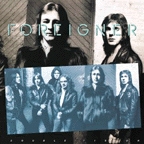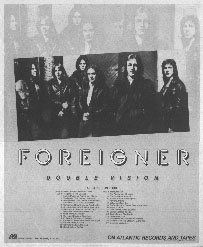![]()
  |

Double Vision
Foreigner
Atlantic 19999
Released: June 1978
Chart Peak: #3
Weeks Charted: 88
Certified 5x Platinum: 10/30/84
 Double vision? One is hard pressed to discern even a single vision on the second Foreigner LP, which is one of the main reasons why this group's current ascendancy is so depressing. Whereas their debut album was wholly concerned with the all-too-familiar, hard-rock Pursuit of the Female ("You search through the years," sang Lou Gramm, "to find a woman, not a girl") Double Vision is incredibly self-absorbed and nearly paralyzed by redoubled caution. The same successful riffs are repeated again here, smoothed out but pulsing with that Gothic pseudopassion so popular now among fans of Kansas, Styx, Meat Loaf et al.
Double vision? One is hard pressed to discern even a single vision on the second Foreigner LP, which is one of the main reasons why this group's current ascendancy is so depressing. Whereas their debut album was wholly concerned with the all-too-familiar, hard-rock Pursuit of the Female ("You search through the years," sang Lou Gramm, "to find a woman, not a girl") Double Vision is incredibly self-absorbed and nearly paralyzed by redoubled caution. The same successful riffs are repeated again here, smoothed out but pulsing with that Gothic pseudopassion so popular now among fans of Kansas, Styx, Meat Loaf et al.
Foreigner combines this approach with another, one that apparently taps a dark, neurotic need in the America rock psyche: the unslakable thirst for a loud, simplistic English boogie band. Here the group continues a lineage that can be traced from Ten Years After through early Led Zeppelin to Bad Company, bands whose drone and thump was or is interrupted only by purple phrases and absurd metaphor mongering. Lots of groups have provided serviceable rock & roll from such a formula, but none of them was silly or prideful enough to allow the imagery and metaphors to dominate the music. Yet this is exactly what Foreigner has done on its new record.
 Click image for larger view. |
As befits a bunch who, among them, have labored in over sixteen professional bands, Foreigner's collective persona is that of the Great Trod Upon, the nice guy who takes shit from women in heroic amounts. That's what the first album's hit, "Cold as Ice," was about, and Double Vision inundates us with the same rather pathetic theme. Lead guitarist Mick Jones, long since extracted from Spooky Tooth, has written or cowritten every song but one here (the best one, by the way), and his self-pity knows no limit: he's bursting with romantic agony. At least that's what the title metaphor seems to be getting at -- all the pent-up frustration and rage felt by the narrator has found its pernicious outlet in a sort of ocular apoplexy. The rest of Jones' complaint is just incomprehensible: "No disguise/For that double vision...My double vision is the best of me." Huh?
Such undisguised bitterness pervades Double Vision, and the record's only good moments arise from spurts of tight ensemble playing. But that's the least we could expect form such grizzled veterans. And songs like "You're All I Am" do gratify in pleasantly odd ways. The surprise influence in this respect is the Beatles: Gramm's McCartney-like coo on "Blue Morning, Blue Day" is charming, while "Love Has Taken Its Toll" surges with a Revolver-era chorus -- all snap and cleverness -- as the guitars of Jones and Ed Gagliardi toss off a kinetic George Harrison/Paul McCartney blend.
But ultimately the group's skill is as mechanical as Mick Jones' paranoid misogyny. An instrumental is normally intended to show off a band's chops and smarts, yet the one provided here, "Tramontane," is puffy, quasi-ominous fluff, relying too heavily on Ian McDonald's spook-house organ effects. The tune's tense chords build but never break, and the accumulated suspense simply fades away.
What is most dispiriting about Foreigner is its patent lack of creative ambition. Not for an instant do we sense that these musicians are pushing themselves or trying to use their expertise to concoct something they find exciting. The emotions and motives asserted in their music are, when not just plain unbelievable, turgid and tawdry. Right now, the group's rhythms and Lou Gramm's singing tickle the ears of a lot of record buyers, but it's difficult to believe that this band will be able to keep its vast audience with more junk like this. We are not as dumb as Foreigner thinks we are.
- Ken Tucker, Rolling Stone, 9/7/78.
Bonus Reviews!
Foreigner is currently the hottest act in the pop-record business. This, the group's second album, had advance orders from record distributors of 1.3 million units, which means that the LP "shipped platinum" to record stores. Though platinum albums are becoming more the norm than the rarity in today's expanded pop market, it is still pretty special for a group to hit platinum its second time out. Atlantic Records, a hot label for twenty-five years, reports that advance orders for Double Vision are the highest in its history.
Given all that, you'd suppose that the music of Foreigner is extremely novel or that the members of the band have the same kind of popular appeal the Beatles used to have. But neither is true. Like the Swedish group Abba, Foreigner makes montages of riffs, figures, chord changes, and sentiments derived from every successful group of the past twenty years -- only they don't do it as clinically as Abba does. The music here is enjoyable and it comes across as candid, but it doesn't have a great deal of personality. Overall, Foreigner sounds like the J. Geils Band before it went stale.
The opening track here, "Hot Blooded," first released as a single, begins with a familiar chug-chug guitar figure like the one used in 1969 on "Gimme Gimme Good Lovin'," a bubblegum hit with rhythm-and-blues overtones, and both songs are about a fellow in search of fleshy fluff. Compare "Blue Morning, Blue Day" with "Six O'Clock," which John Sebastian wrote for the Lovin' Spoonful, and you'll find them cousins. "You're All I Am" is very much in the manner of Paul McCartney (in the days when he was worth hearing), and "Tramontane," an instrumental that is more or less a gilded riff, reminds me of the Band's "Chest Fever." The material was written during a long and hectic road tour, and some of the songs seem to have been dashed off to meet the deadline of a recording date. (The sound, by the way, is excellent; engineer Keith Olsen, who co-produced, is also responsible for the fine, clean sound on Fleetwood Mac's Rumours album.) None of the material approaches "Cold as Ice," the hit single from Foreigner's first album.
So what accounts for the 1.3 million pre-orders? Well, Foreigner is easy to listen to and enjoy. A heavy schedule of personal appearances kept up the momentum of the first hit album and preconditioned the audience for Double Vision, which was released at the beginning of the summer when everyone was ready for summer madness and looking for music to feed or augment it. Finally, the rock audience is no longer looking for heroes to worship but for entertainers. Ideology and fervor are swell things, but they don't leave you much time for dancing.
- Joel Vance, Stereo Review, 10/78.
The hard rock group that made a multiplatinum debut last year follows up with another spirited collection of rock'n'roll that perhaps should stand as a model for competitors, so strong is the material. The six-man ensemble of noted English and American musicians has found a successful formula for combining driving rock with a sense of melody and lyrical precision. Guitarist/keyboardist/vocalist Mick Jones has sharpened his writing skills so greatly that they contain more melody and are custom made for the outstanding vocals of Lou Gramm. The rich, textured vocals and harmonies are striking as are the guitar and bass Iines. Keith Olsen moves in as producer here (along with Jones and guitarist Ian McDonald) and draws all of Foreigner's intensity. Best cuts: "Hot Blooded," "Double Vision," "Blue Morning, Blue Day," "Back Where You Belong," "I Have Waited So Long," "Tramontane."
- Billboard, 1978.
I like rock and roll so much that I catch myself getting off on "Hot Blooded," a typical piece of cock-rock nookie-hating carried along on a riff-with-chord change that's pure (gad) second-generation Bad Company. Fortunately, nothing else here threatens their status as the world's dullest group. Inspirational Verse: "She backhanded me 'cross my face." C-
- Robert Christgau, Christgau's Record Guide, 1981.
Building on the success of the first album, this followup yielded the Top 20 hits "Hot Blooded," "Double Vision," and "Blue Morning, Blue Day." * * *
- Donna DiChario, The All-Music Guide to Rock, 1995.
For a taste of the band's status as sorta-metal, sorta classic rockers, try the sophomore album, Double Vision. Fortified with hits such as "Blue Morning, Blue Day" and the title track, it's a prototypical 70s arena rock album. * * * 1/2
- Eric Deggans, Musichound Rock: The Essential Album Guide, 1996.
Like other "supergroup" acts to have hit the motherlode with their first album, Foreigner's follow-up record to their hugely successful debut set was more of the same AOR hit formula, though this did not stop the band fretting about the task at hand, namely reproducing such a mega-selling success. While their fears were understandable, the album went on to outsell its predecessor, which was still in the charts, delivering more radio friendly rock/pop. The singles "Hot Blooded" and "Double Vision" reached Numbers Three and Two in the US respectively, confirming the band's status as one of the more successful corporate rock acts around.
The band was yet to make a significant impact on the other side of the Atlantic -- "Double Vision" wasn't released as a single in the UK until almost a full year after the release of the album. The album reached Number Three on the US album chart but only scraped into the Top 40 in the UK, peaking at Number 32. The album also marked the departure of bassist Ed Gagliardi, who was replaced by ex-Roxy Music Rick Wills, a childhood chum of Pink Floyd's Dave Gilmour.
The band wrote "Double Vision" after seeing New York Rangers goalie John Davidson get knocked out during the 1977 Stanley Cup Playoffs.
As of 2004, Double Vision was the #22 best-selling album of the 70s.
- Hamish Champ, The 100 Best-Selling Albums of the 70s, 2004.
![]() Reader's Comments
Reader's Comments
No comments so far, be the first to comment.